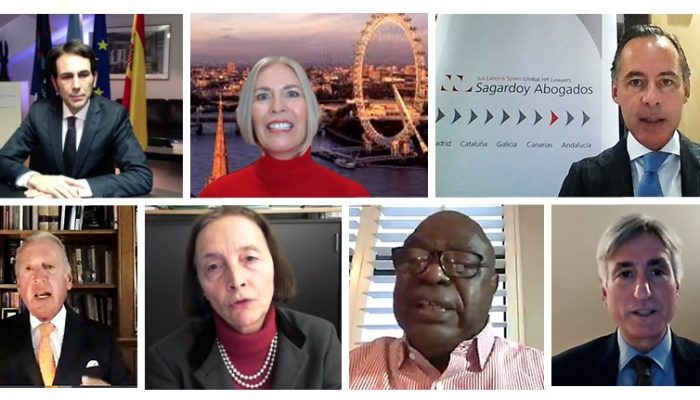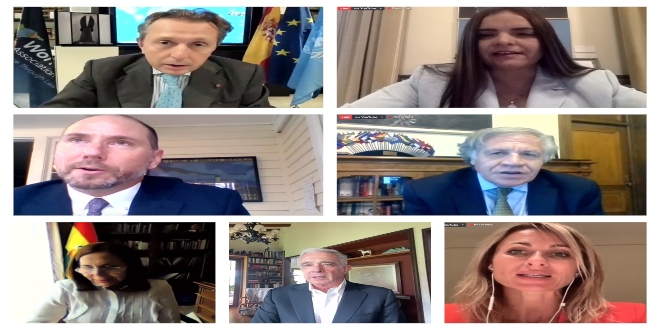Inaugurated by the WJA President for UK, Christina Blacklaws, and Diego Solana, Coordinator of the World Law Congress Colombia 2021, the fifth Opening Session, celebrated from London on December 14, brought together Íñigo Sagardoy, Michael Burd, Renate Hornung-Draus, Daniel Funes de Rioja and Mbhazima Shilowa to discuss about teleworking.
Under the name “New ways of working and the future of work“, this new panel of dicussion focused on how current work trends should be regulated, the key factors for their transformation and the role each stakeholder should play in this field.
“In terms of work, this pandemic has changed everything, everywhere,” said Christina Blacklaws, President of WJA UK, immediate past President of the Law Society of England & Wales and President of Lawtech UK, who recognized that “we are now at the best possible moment to develop technological innovations that will change the way we deliver our services”. Blacklaws also shared data from a British study that “shows that the Covid-19 has accelerated the digital transformation by 5.3 years,” so that “we all know more about technology now than we did eight months ago”.
“We are at the best time to learn technological innovations that will change the way we work“
The debate began with the moderation of Iñigo Sagardoy, co-organizer of the event, president of Sagardoy Abogados and professor of labor law at the Universidad Francisco de Vitoria, who introduced the speakers after analyzing that “coronavirus has accelerated the transformation of organizations and we are at a turning point from which there will be significant regulatory changes in the ways in which companies are organized.
This scenario is confirmed by Renate Hornung-Draus, regional vice-president of the International Organization of Employers for Europe and Central Asia, who assured that “although the measures taken in most western countries to contain the pandemic have accelerated the digital transformation, they have also shown some deficits in the digital infrastructure, as well as its limits”. She advocates for a hybrid model of work with physical presence in the offices, in order to create corporate culture, but always respecting individual freedom. In this matter, she pointed out the difference between teleworking and mobile working, assuring that Germany has legislation on the former: “teleworking refers to a person working from home, it is at a distance, but in a fixed workplace; and it implies that there has to be an agreement between employee and employer by which the rules are respected”.
Michael Burd, head of the employment division at Lewis Silkim (London) and an expert in telework regulation, examined how labor regulation has evolved over the years: “what we see is that legislation and regulation are lagging behind the reality of work”, and acknowledged that “the feeling I have is that it has only increased with the evolution of technology, which is increasingly rapid, and has become more intense with the changes in work practices that have forced us all to change our way of working”. For this reason, and in the event that a worker remotely provides services from another country different from that of the company, he called for “legislation that contemplates key points, such as where to pay taxes, health insurance conditions, social security…” and concluded by recognizing “that local labor legislation in some cases complicates solving the global nature of this type of work”.
With regard to the regulation and negotiation of conditions, Daniel Funes de Rioja, vice president of the International Labor Organization and president of the Argentine Business Confederation, said that “unions must adapt to new realities and contemplate the changes from the perspective of the fourth industrial revolution, otherwise, if they continue thinking in terms of the second or third, technology will evolve without them and a gap will emerge”.
On this matter, Mbhazima Shilowa, former Secretary General of the Congress of South African Trade Unions and former Prime Minister of the South African province of Gauteng, set the current situation as a starting point “to find in the upcoming years better ways to combine different aspects such as, for example, the penetration of the Internet in all places”.
“Social distance and flexibility are required, but this will not be possible without quickly resolving the social difference“.
Among the changes brought about by Covid-19, there is a debate about the vaccine and how it can affect workers’ relationship with their company. Michael Burd highlighted whether employers can demand their employees to be vaccinated or terminate them for not doing so.
“Medical data is considered sensitive information and this will lead to searching for a balance between privacy and security for everyone… This is about protecting health at a collective level“.
The Opening Session London was the fifth preliminary session to the World Law Congress Colombia 2021, coinciding with the 30th anniversary of the Colombian constitution. Through the projection of an institutional video, the president of the host country, Ivan Duque, has committed to “continue promoting the strengthening of the rule of law as fertile ground to allow growth and welfare, development and freedom of citizens”.
FULL SESSION: https://youtu.be/Y8xKC8Xd4X4
SUMMARY SESSION: https://youtu.be/naGKYUREj_k


